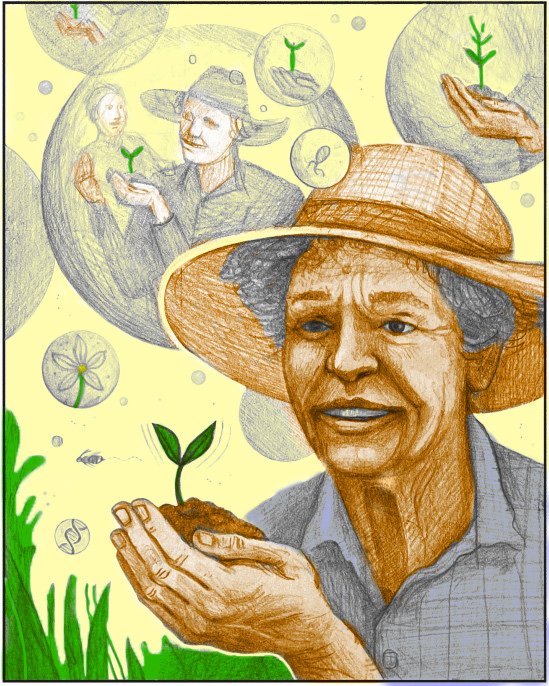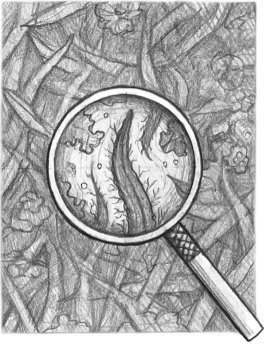Read by Matilda Longbottom

Thornton Wilder, Our Town
What did you plant in your garden the year before last? Or the year before that?
(And no peeking if you’re the sort of well-organized gardener who keeps notes.)
Human memory—packaged between our ears in an organ not much bigger than a grapefruit—is enormous. Scientists calculate that the average human brain can store somewhere around 2.5 quadrillion bytes of information—that is, over 100 times the amount of info contained in the entire Library of Congress. In other words, if you haven’t yet learned Greek, the bassoon, or quantum mechanics, you’ve still got plenty of space to pack them in.
Unfortunately, this doesn’t mean that memory is infallible. We all know—often from chilling personal experience—that it’s quite capable of dropping us like so many lead bricks when it comes to names, birthdays, appointments, Trivial Pursuit answers, and the location of the car keys. This can be humiliating, if not socially disastrous.
Sir Thomas Beecham, flamboyant British conductor and cofounder of the London Philharmonic Orchestra, is said to have once encountered—in the lobby of a Manchester hotel—an elegant woman whose face he recognized but whose name, annoyingly, escaped him. Groping for clues, he vaguely remembered that she had a brother and asked how the brother was and if he were still pursuing the same line of work.
“Oh, he’s very well,” the woman replied. “And still king.”
Urk. We can all sympathize.
On the other hand (take comfort), forgetting—rather than memory’s evil twin—can be a good thing. People with a condition known as highly superior autobiographical memory (HSAM) remember the details of every life event: they can tell you what day of the week May 7 fell on ten years ago and exactly what they did on that day, including what they wore, whom they said what to, what the weather was like, and what time they caught the bus.
Such a wealth of nit-picky information can be overwhelming, and the rare people who accumulate it often struggle with obsessive behavior and an inability to generalize. That is, faced with too much memory, we lose the ability to identify the gist of an experience. If attacked by a swarm of bees, for example, we need to remember what sort of nest not to poke with our walking stick, not what color socks we were wearing at the time nor the shape of the clouds in the sky. Controlled forgetting, researchers guess, allows us to retain the important bits of an experience, which in turn helps us cope effectively with similar events in the future.

In many—if not most—cases, human memory failures are the fault of sheer lack of attention. Researchers point out that we all ignore a lot of what’s going on around us. This is what makes us such lousy eyewitnesses.
German psychologist William Stern, in the early 1900s, sneakily roped his graduate students into serving as guinea pigs in what he called an “event experiment.” During a class, he had a confederate (known for experimental purposes as T, for Target) enter the classroom, deliver a manila envelope, remove a book from a shelf, loiter a bit, and then leave. Later, the students were asked to describe what had happened. Answers were wildly contradictory: some remembered T’s brown hair as blonde or black; his gray jacket was variously described as blue or brown; and nobody agreed as to whether or not he had a beard or wore spectacles, when he arrived and departed, or how much time he spent in the classroom. Nobody, it turned out, had paid attention.
Henry David Thoreau, who had a lot of negative things to say about the unobservant habits of humankind, is shown in the play The Night Thoreau Spent in Jail urging people to take a good look at the marvels of the natural world around them:
“In this single pasture there are three hundred distinct and separate varieties of grass. I know, I have catalogued them myself. You look down and you say: ‘That’s grass. Grass is grass.’ Ridiculous. You have missed the splendid variety of the show.”
Ithink about this every Spring.
Gardens, after you plant enough of them, all begin to run together in memory. I can’t remember which year that we (inadvertently) planted all those purple bell peppers, which year an unexpected frost did in all the seedlings on the porch, or which year (never to be repeated) we planted way too many hills of spectacularly prolific, Sorcerer’s-Apprentice-like zucchini. This is the gardener’s version of Dylan Thomas’s A Child’s Christmas in Wales, in which Thomas, looking back, couldn’t remember whether it had snowed for twelve days and twelve nights when he was 6 or for six days and six nights when he was 12.
Such memory loss is inevitable for the vast majority of us: repetition, science shows us, does autobiographical memories in. The memory-damping effect of repetition is why you probably can’t remember what you had for lunch last Tuesday: memories of many similar lunches pile up on top of each other, blending together until it’s difficult to differentiate one from the other. So it also goes with Christmases and gardens.
I tend to take our garden for granted. After all, we’ve seen it all before. We plant one every year, sometime around Memorial Day. Shortly thereafter we cut lettuce and harvest scallions; later we pick cucumbers, peppers, and tomatoes, and pull up beets and carrots. Later still, we bring in pumpkins. And then, come the following Spring, we get up and do it again.
As I get older though, I realize—human longevity being what it is—we only get so many gardens. And a garden isn’t just a garden; every year it’s a unique event, an impressive demonstration of what seeds, given a little encouragement, can do.
As garden after garden slips by, we likely won’t remember each and every one. But come each Spring we can appreciate, observe, and pay attention—and enjoy the new and splendid variety of the show. ❖


 Previous
Previous

